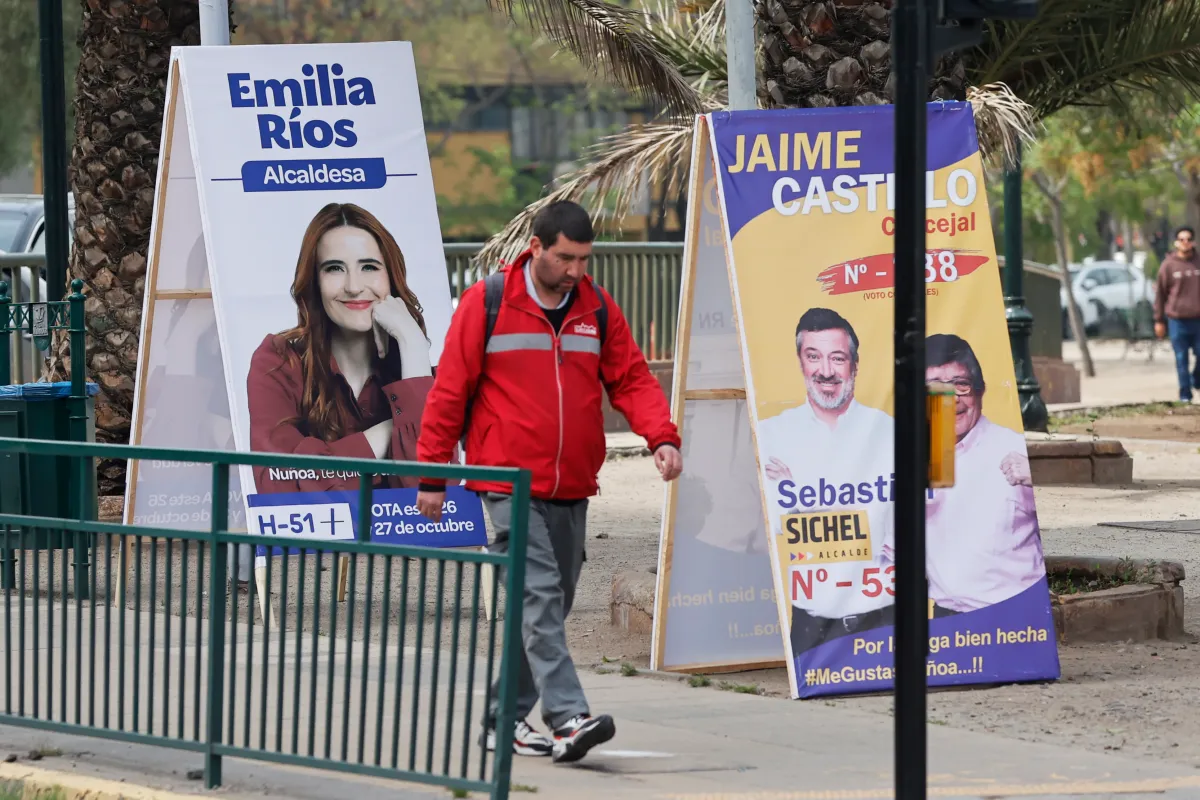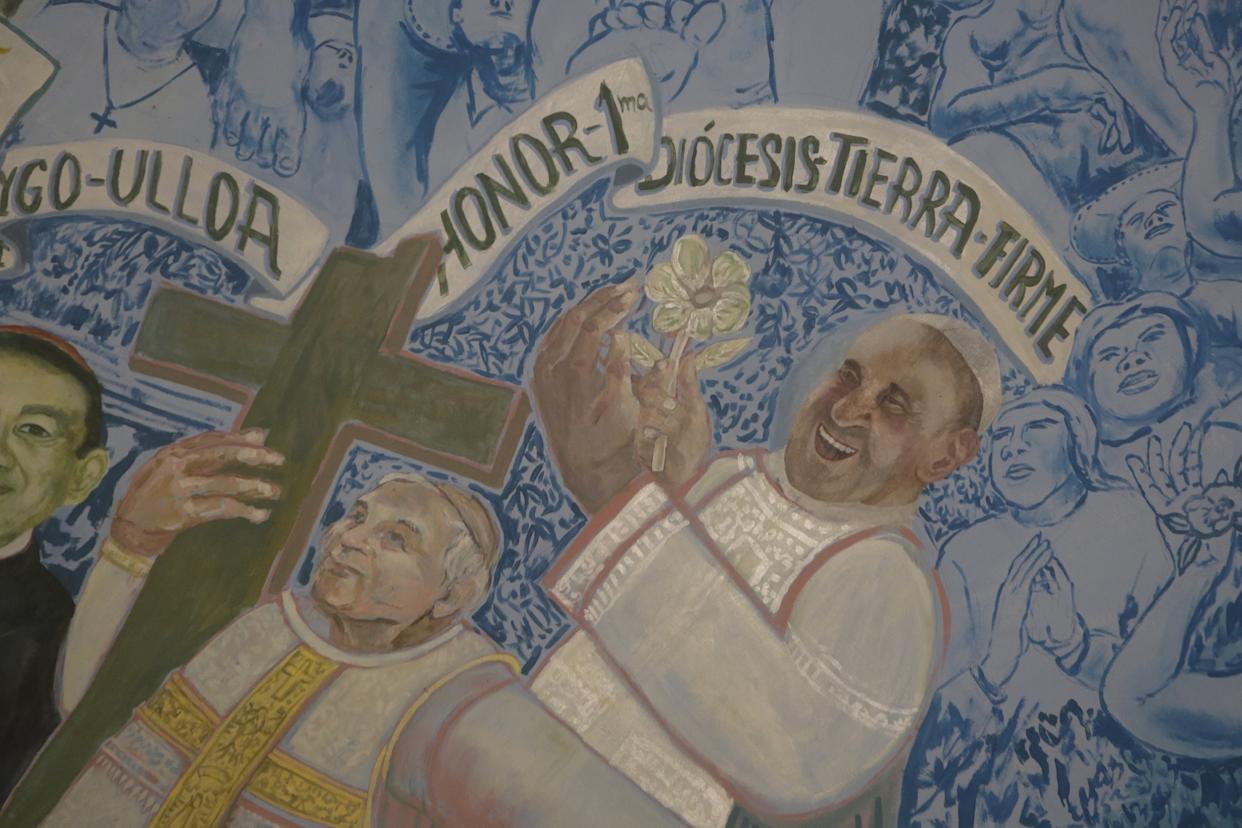International
Insecurity and corruption will take the interest in the campaign for the local elections in Chile

Chileans will elect 345 mayors and 16 regional governors in a month in elections considered a thermometer of the 2025 presidential elections and marked by the increase in crime and by one of the largest cases of corruption in the recent history of Chile, which splashes the country’s elite.
The campaign began on August 28, but the period for electoral propaganda began this Friday and the streets and squares were filled with posters and posters with the faces of the candidates from the early morning.
As in 2021, the elections will be held in two days (October 26 and 27), but unlike then, these will be the first municipal and regional elections held with the new compulsory voting system, re-established in 2022 after 10 years of voluntary participation.
“Chile faces these elections in a climate of distrust in the system. The parties have had difficulties facing the most pressing problems of citizenship, and the distance with it only grows. It is not surprising that independent candidates have grown,” Rodrigo Pérez de Arce, a researcher at the Faro Center of the University of Development (UDD), told EFE.
United official party and fragmented opposition
The broad and diverse coalition that governs Chile, made up of President Gabriel Boric’s Broad Front, the Communist Party and the center-left forces, will run together with the municipal ones.
He will do it together with the Christian Democracy, which is not part of the Executive, but is its ally in many votes.
In the regionals they did not manage to reach agreements, which could be an impediment to revalidating the broad triumph of 2021, when the left and the center took over all the regions, except the southern Araucanía, governed by the liberal Luciano Rivas.
“The left will have to maneuver with the low popularity of the Government, especially in the field of management and security. At least, they should aim to retain important municipalities for them, such as Valparaíso, Ñuñoa, Maipú or Santiago. Otherwise, I think there will be long faces in that coalition,” Pérez de Arce said.
The fragmentation and conflict on the right is total both in municipal and regional: the forces of the traditional wing grouped in Chile Vamos (National Renewal, UDI and Evópoli) failed to agree with either the ultra-right (Republican Party and Social Christian Party) or with the People’s Party.
For former deputy and electoral expert Pepe Auth, the atomization “is motivated, more than in the aspiration to govern regions, in the need to position leadership for the parliamentary elections of 2025.”
“The right is not going to do well because it does not present itself in a cohesive way and is not acting proactively. Probably the sector that benefits from all this division is the Republican Party,” Octavio Avendaño, an academic at the University of Chile, told EFE.
Insecurity and corruption in Chile
The security crisis that Chile has been experiencing for some time due to the arrival of transnational organized crime is one of the star issues of the campaign and, according to experts, could harm the official candidates.
The feeling of insecurity continues to grow and crime has become the greatest citizen concern.
“In the ruling party there is low mood, we are in the last stretch of the mandate, there is conviction that not as many changes can be made as we thought and the fight against crime has taken away all the energy from the Government,” she told Jeanne Simone, of the Network of Political Scientists and the University of Concepción.
The country is also shocked by the so-called “Audios Case”, a mega plot of corruption and influence peddling in the elite, which has even splashed up to the Supreme Court and of which all its edges are not yet known.
The case especially affects the traditional right, since its protagonist, lawyer Luis Hermosilla, was an advisor to the Ministry of the Interior when it was led by the ultra-conservative Andrés Chadwick during the second government of his cousin, former president Sebastián Piñera (2018-2022).
“Faced with a government as weakened as that of Boric, the right has failed to channel citizen discontent. He has not been able to carry out an alternative agenda to the Government’s agenda, which is very confusing, and now the Audios Case has erupted,” Avendaño stressed to EFE.
International
DHS Secretary Kristi Noem’s Purse Stolen in D.C. Restaurant Heist

The purse of Kristi Noem, Secretary of the Department of Homeland Security, was stolen on Sunday night at a restaurant in Washington, D.C., Fox News Digital confirmed through several agency sources.
The handbag, taken by a white male wearing a mask, reportedly contained $3,000 in cash along with personal documents, including her passport, keys, driver’s license, and DHS badge, according to an agency spokesperson.
“Her entire family was in town, including her children and grandchildren. She was celebrating her retirement by treating them to dinner, activities, and Easter gifts,” the spokesperson added.
Crime continues to be a significant issue in the U.S. capital, particularly theft. However, violent crime reached its lowest level in 30 years last year, according to the Office of the Attorney General at the time.
International
Pope Francis: The Quiet Architect Behind the U.S.-Cuba Thaw

When then-U.S. President Barack Obama and Cuban President Raúl Castro announced the reestablishment of diplomatic relations in December 2014—after decades of hostility—there was a third figure present in both speeches: Pope Francis.
This thaw in U.S.-Cuba relations—later reversed by Donald Trump—was the result of behind-the-scenes negotiations personally encouraged by Pope Francis, who passed away on Monday at the age of 88, just over a year after becoming head of the Catholic Church.
Upon learning the news of the breakthrough, the pontiff humbly stated, “This was made possible thanks to the ambassadors and to diplomacy,” which he called “a noble, very noble job.”
In 2015, months after the announcement, Raúl Castro visited the Vatican and met with the pope. Over time, Castro developed a fondness for Francis that he never had for his predecessors, Benedict XVI and John Paul II. “If the Pope continues talking like this, sooner or later I’ll start praying again and return to the Catholic Church—and I’m not joking,” said the younger Castro, who, like his brother Fidel (1926–2016), had been educated by Jesuits—the same order to which Pope Francis belonged.
Pope Francis visited Cuba later that year. Just days before his arrival, the Cuban government announced the pardon of 3,522 common prisoners as an act of clemency.
While in Havana, the pope met with Fidel Castro, who gave him a first edition of the book Fidel and Religion by Brazilian friar and liberation theologian Frei Betto.
Criticism from the Opposition
Francis’s diplomatic approach also drew criticism from parts of the Cuban opposition. In a 2022 interview with Univision, the pope revealed he had “a human relationship” with Raúl Castro.
International
Dominican Republic Declares Three Days of Mourning for Pope Francis

Dominican Republic President Luis Abinader has declared three days of national mourning starting Tuesday following the death of Pope Francis, who passed away on Monday at the age of 88 in his residence at the Casa Santa Marta.
In an official decree, Abinader highlighted the pope’s legacy “as a global leader who promoted significant reforms within the Catholic Church and was known for his humility, openness to dialogue, and commitment to peace among nations.”
During the mourning period, the national flag will be flown at half-staff at military facilities and public buildings.
According to a statement from the Office of the Presidency, although Pope Francis never visited the Dominican Republic during his papacy, he maintained a close relationship with the country. He expressed solidarity and empathy during difficult times, including offering prayers for the victims of the recent tragedy at a Santo Domingo nightclub on April 8, which claimed 232 lives and left more than 180 injured.
-

 Central America5 days ago
Central America5 days agoNicaraguan Exiles to Mark 7th Anniversary of 2018 Protests with Global Commemorations
-

 International5 days ago
International5 days agoDominican ‘False Hero’ Arrested for Faking Role in Nightclub Collapse That Killed 231
-

 Central America4 days ago
Central America4 days agoUN complaint filed against Costa Rica over detention of migrant children
-

 International4 days ago
International4 days agoACLU seeks emergency court order to stop venezuelan deportations under Wartime Law
-

 Central America2 days ago
Central America2 days agoSenator Van Hollen Meets with Deported MS-13 Member in El Salvador; Trump and Bukele React
-

 International2 days ago
International2 days agoThousands rally nationwide against Trump’s threat to U.S. democracy
-

 International2 days ago
International2 days agoPope Francis Appears for Easter Blessing, Calls for Peace and Religious Freedom
-

 Central America15 hours ago
Central America15 hours agoCardinal Rodríguez to Attend Funeral of Pope Francis: “He Was Very Dear to Me”
-

 Central America15 hours ago
Central America15 hours agoNicaragua’s Ortega and Murillo Mourn Pope Francis, Acknowledge ‘Difficult’ Relationship
-

 International15 hours ago
International15 hours agoDominican Republic Declares Three Days of Mourning for Pope Francis
-

 International15 hours ago
International15 hours agoDHS Secretary Kristi Noem’s Purse Stolen in D.C. Restaurant Heist
-

 International15 hours ago
International15 hours agoPope Francis: The Quiet Architect Behind the U.S.-Cuba Thaw















